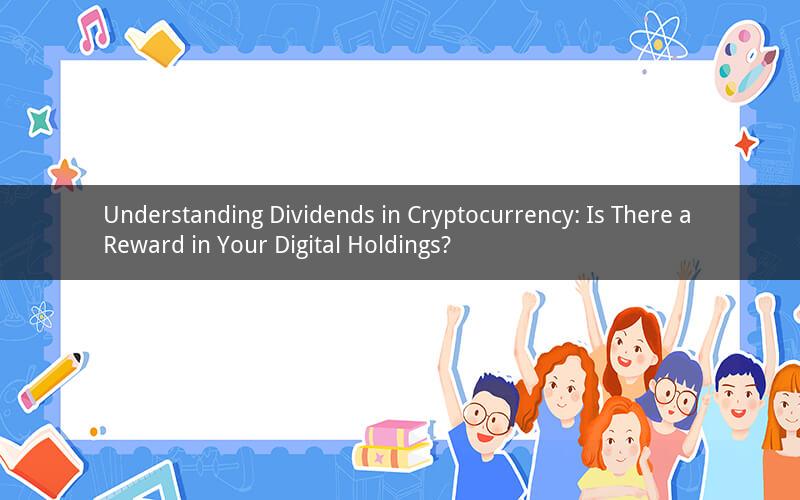
Introduction:
In the rapidly evolving world of cryptocurrency, investors are always on the lookout for ways to maximize their returns. One question that frequently arises is whether cryptocurrencies offer dividends. In this article, we will delve into the concept of dividends in the context of cryptocurrency, exploring whether there is indeed a reward for holding digital assets.
Dividends in Cryptocurrency: What Are They?
Dividends, in the traditional financial sense, are payments made by a company to its shareholders as a share of the profits. When a company earns a profit, it may choose to distribute a portion of those earnings to its shareholders in the form of dividends. However, in the cryptocurrency space, the concept of dividends is a bit different.
In the cryptocurrency realm, dividends are not as commonly associated with the traditional definition. Instead, they refer to rewards or incentives given to cryptocurrency holders in recognition of their participation in the network. These rewards can come in various forms, such as block rewards, transaction fees, or airdrops. While not exactly the same as dividends, they serve a similar purpose of rewarding investors for holding onto their digital assets.
Is There Dividend in Cryptocurrency?
The answer to whether there is a dividend in cryptocurrency is not a straightforward yes or no. It largely depends on the specific cryptocurrency in question. Here are a few factors to consider:
1. Proof-of-Work (PoW) vs. Proof-of-Stake (PoS) Cryptocurrencies:
Proof-of-Work (PoW) cryptocurrencies, such as Bitcoin, generate rewards through mining. Miners compete to solve complex mathematical puzzles, and as a result, they receive a block reward. While this can be seen as a form of dividend, it is not distributed to all holders of the cryptocurrency. Only those who participate in mining are eligible for these rewards.
On the other hand, Proof-of-Stake (PoS) cryptocurrencies, such as Cardano and Polkadot, offer rewards to validators who help secure the network. Validators are selected based on the number of tokens they hold and stake. In this case, all token holders, to some extent, benefit from the rewards generated by the network, making it more analogous to a dividend.
2. Tokenomics:
Tokenomics refers to the economic model of a cryptocurrency, including its supply, distribution, and reward mechanisms. Some cryptocurrencies have built-in mechanisms that distribute rewards to token holders, while others do not. It is essential to research the tokenomics of a particular cryptocurrency to determine if it offers dividend-like rewards.
3. Airdrops and Bonuses:
In addition to block rewards and staking rewards, some cryptocurrencies may offer airdrops or bonuses to token holders. An airdrop is a distribution of tokens to existing holders of another cryptocurrency or a specific platform. While not exactly dividends, airdrops can provide additional value to investors.
Top Cryptocurrencies Offering Dividend-Like Rewards:
1. Ethereum (ETH):
Ethereum's upcoming transition to Proof-of-Stake, known as Ethereum 2.0, will introduce a new mechanism for rewarding validators. This will result in a more decentralized and energy-efficient network, and token holders who participate in staking will receive rewards.
2. Cardano (ADA):
Cardano uses a PoS consensus mechanism, where validators are rewarded for their contributions to the network. Token holders who delegate their ADA tokens to validators can receive a portion of these rewards.
3. Polkadot (DOT):
Polkadot operates on a PoS consensus mechanism, and token holders can become validators or delegates. Validators are rewarded for their participation, and delegates can earn a share of these rewards based on the amount of DOT they lock up.
4. Tezos (XTZ):
Tezos is a self-amending blockchain that rewards validators for their contributions to the network. Token holders can delegate their XTZ tokens to validators, and in return, they receive a portion of the rewards.
5. Uniswap (UNI):
Uniswap is a decentralized exchange platform that offers liquidity mining rewards to token holders. By providing liquidity to the platform, users can earn rewards in the form of UNI tokens.
Frequently Asked Questions (FAQs):
1. Q: Can I receive dividends from holding Bitcoin?
A: No, Bitcoin does not offer dividends. Its rewards are generated through mining, and only miners receive block rewards.
2. Q: Do I need to actively participate in mining to receive rewards in PoW cryptocurrencies?
A: No, you do not need to actively mine to receive rewards. You can purchase cryptocurrency and hold it, and if the network offers dividend-like rewards, you may still benefit.
3. Q: Are dividend-like rewards guaranteed in PoS cryptocurrencies?
A: While PoS cryptocurrencies offer a more predictable and sustainable reward system compared to PoW, the rewards are not guaranteed. The exact amount and distribution can vary based on the network's rules and the behavior of validators.
4. Q: Can I earn dividends by simply holding a cryptocurrency?
A: In some cases, yes. PoS cryptocurrencies, such as Cardano and Polkadot, offer rewards to token holders who delegate their tokens to validators. However, not all cryptocurrencies have dividend-like reward mechanisms.
5. Q: Are dividend-like rewards taxable?
A: Tax regulations regarding cryptocurrency rewards vary by jurisdiction. It is advisable to consult a tax professional or refer to the relevant tax laws in your country to determine the tax implications of receiving dividend-like rewards.
Conclusion:
While cryptocurrencies do not offer traditional dividends, they do provide various forms of rewards to token holders. The presence of dividend-like rewards depends on the specific cryptocurrency, its consensus mechanism, and its tokenomics. By understanding the intricacies of the cryptocurrency you are invested in, you can better assess the potential rewards and make informed decisions about your digital holdings.